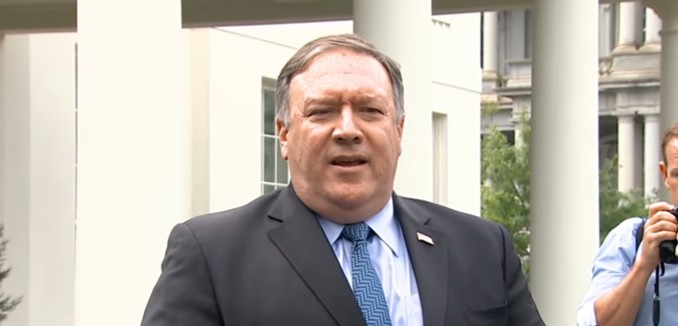After France accused Iran’s Ministry of Intelligence of plotting a bomb attack on an exiled opposition group’s rally outside of Paris, United States Secretary of State Mike Pompeo said Wednesday that the plan “lays bare Iran’s continued support of terrorism throughout Europe,” and justifies the Trump administration’s re-imposition of sanctions on the Islamic Republic.
The Jerusalem Post reported that Pompeo praised Germany’s decision a day prior to extradite an Iranian diplomat to Belgium on charges of his alleged role in the bomb plot. The Iranian official, Assadollah Assadi, who worked for the Islamic Republic’s mission in Austria, stands accused of handing a bomb to attackers who were targeting Iranian opposition supporters in France.
“The scale of this plot, which involved arrests of numerous suspects across Europe – including in Belgium, France and Germany – reminds us that Iran remains the world’s leading state sponsor of terrorism,” Pompeo said. “We support our European allies in exposing and countering the threat that Iranian-backed terrorism poses around the world.”
The State Department recently released a report on Iran’s “destructive activities,” highlighting the country’s role as the leading state sponsor of terrorism.
“After a brief lull in the 1990s and early 2000s, Iran has ramped up its active involvement in worldwide terrorist plotting and attacks, with numerous terrorist operations uncovered or disrupted in Europe, North and South America, Africa, and Asia since 2009,” asserts the report.
The paper was published on the sidelines of the UN General Assembly in New York last month, where the Trump administration lobbied European allies to support nuclear-related sanctions.
“The pace of these activities indicates that Iran remains committed to using terrorism to achieve its objectives and is confident in its ability to operate anywhere in the world,” the report continues. As examples, the State Department cited 17 arrests and searches of Iranian officials linked to terrorism in Bulgaria, Bosnia and Herzegovina, Turkey, and Germany since 2012, in addition to the latest charges related to the foiled attack in Paris.
The U.S. withdrew from the 2015 nuclear accord with Iran last May, citing the many loopholes of the agreement, as well as its failure to contain Tehran’s illicit non-nuclear activities, including its support for terror and its military campaigns in Yemen, Syria, Lebanon, and Iraq.
France, Britain, Germany, China, and Russia have thus far remained in the agreement and resisted renewed U.S. sanctions. The harshest of Washington’s sanctions, which will target Iran’s energy sector, are scheduled to resume next month on November 5.
[Photo: PBS Newshour / YouTube ]




